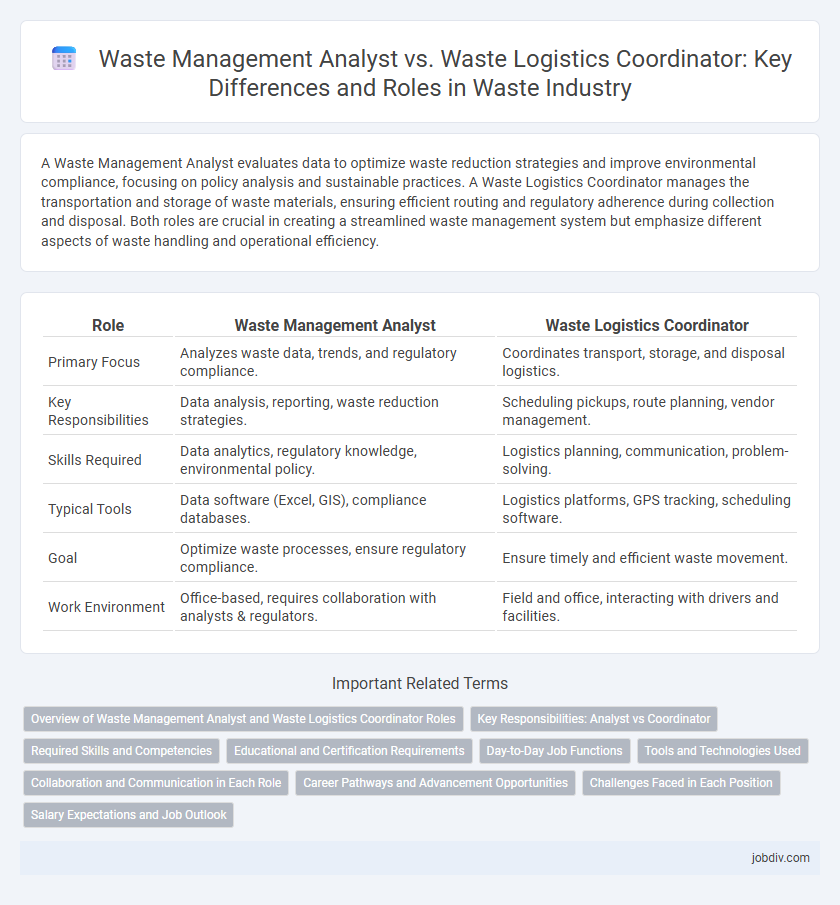A Waste Management Analyst evaluates data to optimize waste reduction strategies and improve environmental compliance, focusing on policy analysis and sustainable practices. A Waste Logistics Coordinator manages the transportation and storage of waste materials, ensuring efficient routing and regulatory adherence during collection and disposal. Both roles are crucial in creating a streamlined waste management system but emphasize different aspects of waste handling and operational efficiency.
Table of Comparison
| Role | Waste Management Analyst | Waste Logistics Coordinator |
|---|---|---|
| Primary Focus | Analyzes waste data, trends, and regulatory compliance. | Coordinates transport, storage, and disposal logistics. |
| Key Responsibilities | Data analysis, reporting, waste reduction strategies. | Scheduling pickups, route planning, vendor management. |
| Skills Required | Data analytics, regulatory knowledge, environmental policy. | Logistics planning, communication, problem-solving. |
| Typical Tools | Data software (Excel, GIS), compliance databases. | Logistics platforms, GPS tracking, scheduling software. |
| Goal | Optimize waste processes, ensure regulatory compliance. | Ensure timely and efficient waste movement. |
| Work Environment | Office-based, requires collaboration with analysts & regulators. | Field and office, interacting with drivers and facilities. |
Overview of Waste Management Analyst and Waste Logistics Coordinator Roles
Waste Management Analysts evaluate waste disposal processes, analyze data trends, and develop strategies to improve environmental compliance and operational efficiency. Waste Logistics Coordinators organize the transportation, storage, and distribution of waste materials, ensuring timely pickups and proper handling according to regulatory standards. Both roles are essential for optimizing waste workflows, with analysts focusing on strategic improvements and coordinators managing logistical execution.
Key Responsibilities: Analyst vs Coordinator
A Waste Management Analyst focuses on evaluating waste data, developing strategies for waste reduction, and ensuring compliance with environmental regulations. In contrast, a Waste Logistics Coordinator manages the scheduling, transportation, and coordination of waste collection and disposal operations to optimize efficiency. Both roles require a deep understanding of waste handling processes, but the Analyst emphasizes data-driven decision-making while the Coordinator ensures operational execution.
Required Skills and Competencies
Waste Management Analysts require strong data analysis skills, proficiency in environmental regulations, and expertise in waste audit methodologies to evaluate and optimize waste reduction strategies. Waste Logistics Coordinators need competencies in supply chain management, route planning software, and effective communication with disposal facilities to ensure efficient waste collection and transportation. Both roles demand problem-solving abilities and knowledge of sustainability practices but differ in analytical versus operational focus.
Educational and Certification Requirements
A Waste Management Analyst typically requires a bachelor's degree in environmental science, waste management, or a related field, often supplemented by certifications such as the Certified Waste Management Professional (CWMP) or LEED accreditation. In contrast, a Waste Logistics Coordinator usually needs a high school diploma or associate degree, with certifications like OSHA safety training and hazardous materials handling being advantageous. Both roles benefit from knowledge of environmental regulations, but the analyst role demands more advanced education and specialized certification to perform data analysis and strategic planning effectively.
Day-to-Day Job Functions
Waste Management Analysts focus on evaluating and improving waste disposal systems by analyzing data trends, regulatory compliance, and cost-efficiency to develop sustainable waste reduction strategies. Waste Logistics Coordinators oversee the scheduling, transportation, and storage of waste materials, ensuring timely collection and adherence to safety protocols. Both roles require collaboration with environmental teams, but Analysts prioritize planning and reporting while Coordinators manage operational workflow.
Tools and Technologies Used
Waste Management Analysts utilize data analytics software, geographic information systems (GIS), and predictive modeling tools to optimize waste reduction strategies and regulatory compliance. Waste Logistics Coordinators rely heavily on routing software, fleet management systems, and real-time tracking technologies to streamline waste collection, transportation, and disposal processes. Both roles integrate IoT devices and cloud-based platforms to enhance operational efficiency and data accuracy in waste management workflows.
Collaboration and Communication in Each Role
Waste Management Analysts collaborate with environmental teams and regulatory bodies to optimize waste reduction strategies through data analysis and reporting. Waste Logistics Coordinators communicate closely with collection crews and facility managers to ensure timely and efficient waste transport and disposal operations. Both roles require strong communication skills, but Analysts focus on strategic collaboration while Coordinators emphasize operational coordination.
Career Pathways and Advancement Opportunities
A Waste Management Analyst focuses on data analysis, regulatory compliance, and sustainability strategies, often advancing into environmental consultancy or policy development roles. In contrast, a Waste Logistics Coordinator manages transportation, scheduling, and operational workflows, with career progression typically leading to senior logistics management or supply chain coordination positions. Both pathways offer growth through specialized expertise, but analysts generally transition toward strategic planning, while coordinators concentrate on operational efficiency and resource allocation.
Challenges Faced in Each Position
Waste Management Analysts face challenges in analyzing large datasets to optimize waste reduction strategies, ensuring regulatory compliance, and forecasting environmental impacts accurately. Waste Logistics Coordinators struggle with coordinating timely waste collection routes, managing disposal schedules amid fluctuating volumes, and maintaining communication between multiple stakeholders. Both roles demand adept problem-solving skills to address operational inefficiencies and environmental regulations within the waste management sector.
Salary Expectations and Job Outlook
Waste Management Analysts typically command higher salary expectations, averaging around $70,000 annually, due to their expertise in data analysis and strategic planning. Waste Logistics Coordinators earn approximately $50,000 to $60,000 per year, reflecting their focus on operational efficiency and coordination of waste collection and disposal. Job outlook for both roles is positive, with Waste Management Analysts experiencing faster growth driven by increasing regulatory requirements and sustainability initiatives.
Waste Management Analyst vs Waste Logistics Coordinator Infographic

 jobdiv.com
jobdiv.com